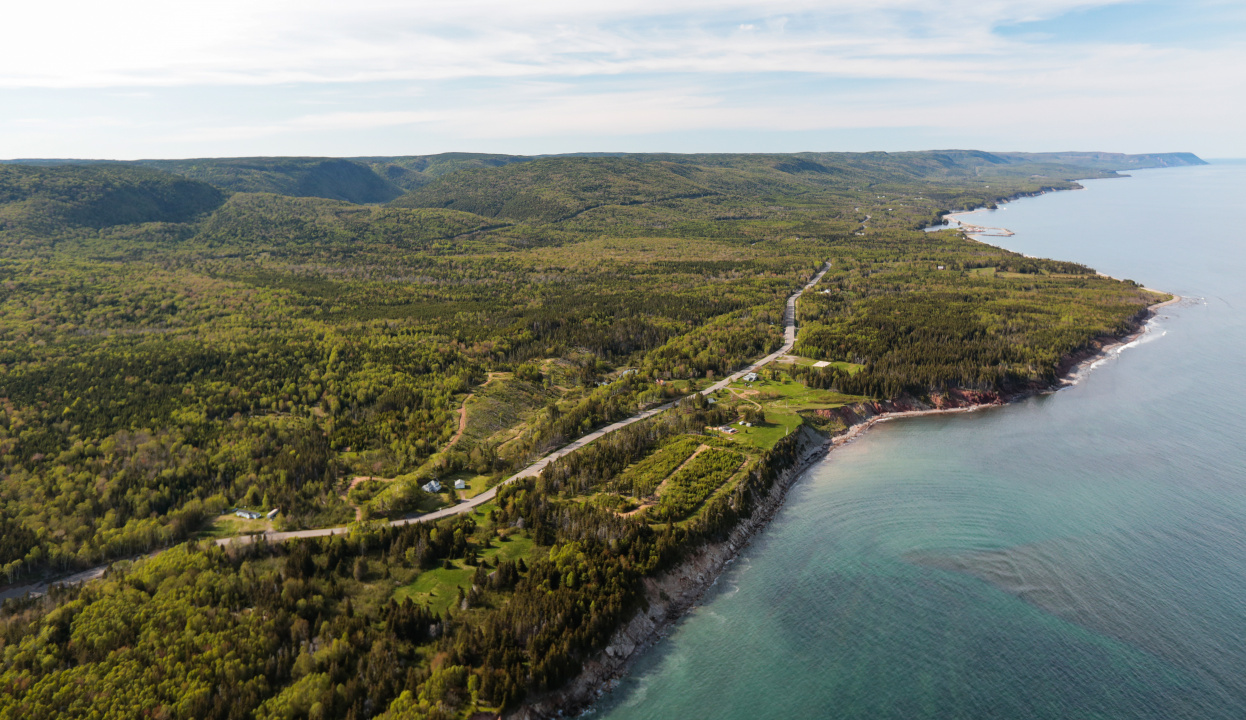Nova Scotia Delegation Supports Federal Offshore Wind Bill

The Breton Cove shoreline in Victoria County; Tory Rushton, Minister of Natural Resources and Renewables, spoke today, June 13, to the senate in favour of a bill that will help Nova Scotia establish an offshore wind industry. (Communications Nova Scotia / File).
Nova Scotia sent a clear message to Ottawa today, June 13, that federal legislation must pass quickly to help establish the offshore wind industry.
“Offshore wind and green hydrogen are game changers for our province, and there’s a lot of work to do to establish these industries,” said Tory Rushton, Minister of Natural Resources and Renewables. “We need our federal partners to move fast so we can stay on course, do our work and make sure Nova Scotia reaps all the benefits of this clean energy for our environment and for our green economy.”
Minister Rushton was in Ottawa to speak in favour of Bill C-49 at the Senate Standing Committee on Energy, the Environment and Natural Resources. The legislation would expand the mandate of the Canada-Nova Scotia Offshore Petroleum Board so it can regulate offshore renewables. It must be passed before Nova Scotia can make the same change in provincial legislation.
Minister Rushton stressed that swift passage of the federal bill is important so that Nova Scotia can meet its goals, including issuing the first call for bids for offshore wind licences next year and offering licences for five gigawatts of offshore wind energy by 2030.
The Minister also highlighted that the Mi’kmaq of Nova Scotia are clean energy leaders and affirmed that the government will continue to honour its duty to consult. He restated the government’s commitment to building the offshore wind industry without harming traditional industries or the environment.
A delegation of Nova Scotia clean energy leaders attended the Senate meeting to show their support for Bill C-49:
- Darryl McDonald, CEO, Potlotek Development Corporation, on behalf of Chief Wilbert Marshall, Potlotek First Nation
- Jennifer Deleskie, Vice-President of Business Development and Public Affairs, Membertou Development Corporation, on behalf of Chief Terry Paul, Membertou First Nation
- Amanda Mombourquette, Warden, Municipality of the County of Richmond
- Gordon MacDonald, Director of Economic Development, Municipality of the District of Guysborough
- Elisa Oberman, Executive Director, Marine Renewables Canada.
Offshore wind is part of the Province’s plan to reach net zero by 2050. Most renewable electricity from offshore wind will be used to produce green hydrogen. Excess may allow Nova Scotia to become a net exporter of clean energy.
Quotes:
“For the first time in our region, in an industry of this magnitude, Indigenous communities are at the table with ownership stakes in projects. These are true nation-to-nation projects that will create immense opportunities for our people for the next seven generations. Our waters have long since sustained our communities, and it’s up to today’s leadership to make moves that support harnessing our resources once again, to ensure continued progress for all.”
— Chief Terry Paul, Membertou First Nation
“Offshore wind represents a generational economic development and climate adaptation opportunity, not just for Nova Scotia, but for Canada. In Richmond County, with our Point Tupper Heavy Industrial Park, we are well positioned to support an offshore wind sector. Green businesses rely on a plentiful supply of green electrons to meet climate targets and to access new markets. Our regulatory processes are incredibly robust and engagement is ongoing through processes like the regional assessment, so delaying will risk pushing private investment to other areas of the world.”
— Amanda Mombourquette, Warden, Municipality of the County of Richmond
“The amended accord acts are critical to the future of the offshore wind industry in Canada and to Marine Renewables Canada’s members. Nova Scotia has some of the best offshore wind resources in the world, and developing this new sector will help support our clean energy and net-zero goals, spur economic opportunities and create new jobs. The establishment of a regulatory framework will move us closer to realizing these opportunities and to advancing offshore wind in Canada. The time is now; a regulatory path is needed to give certainty and confidence to investors and to ensure sustainable and responsible development of this new industry.”
— Elisa Oberman, Executive Director, Marine Renewables Canada
Quick Facts:
- the federal and provincial governments jointly manage Nova Scotia’s offshore
- to allow for offshore wind development, both governments need to amend their respective legislation before the Province can issue the first call for bids for offshore wind licences, planned for 2025
- it is anticipated that Nova Scotia’s first offshore wind projects will be established between 2030 and 2035
- the Province continues to gather input for regulation of offshore wind in partnership with the federal government through a regional assessment
- the Province also plans to release the second module of the Nova Scotia Offshore Wind Roadmap this summer to seek further feedback
Additional Resources:
Senate Standing Committee on Energy, the Environment and Natural Resources: https://sencanada.ca/en/committees/enev/44-1
Federal Canada-Nova Scotia Offshore Petroleum Resources Accord Implementation Act: https://laws.justice.gc.ca/eng/acts/C-7.8/
Nova Scotia accord act: https://www.nslegislature.ca/sites/default/files/legc/statutes/canada-ns%20offshore%20petroleum.pdf
Regional assessment for offshore wind: https://iaac-aeic.gc.ca/050/evaluations/proj/83514
News release – Offshore Wind Projects in Jointly Managed Waters to be Regulated First: https://news.novascotia.ca/en/2023/11/22/offshore-wind-projects-jointly-managed-waters-be-regulated-first
Offshore wind road map: https://novascotia.ca/offshore-wind/docs/offshore-wind-roadmap.pdf
Green Hydrogen Action Plan: https://novascotia.ca/green-hydrogen/docs/green-hydrogen-action-plan.pdf